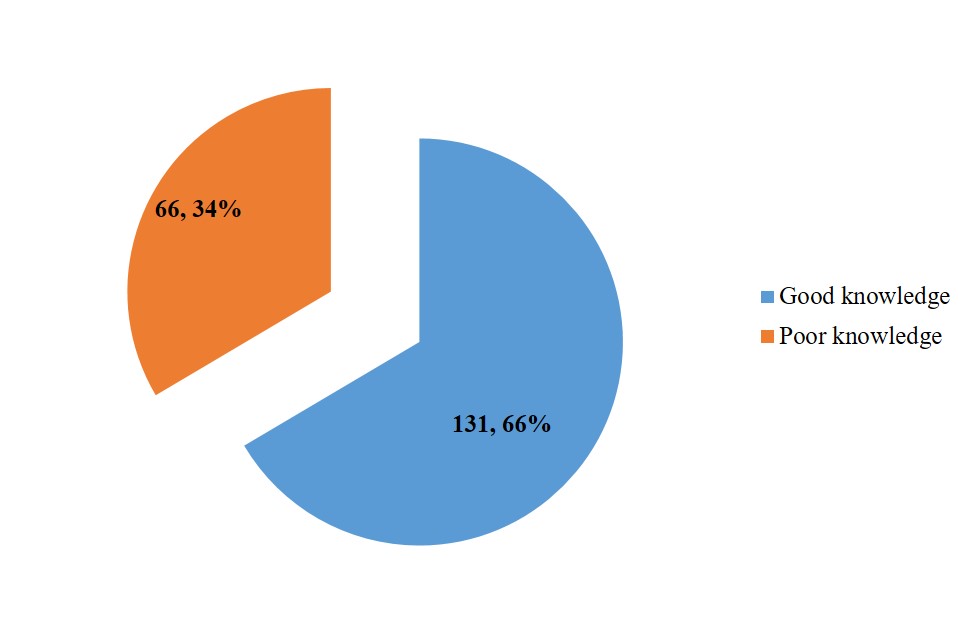The Knowledge and Attitude of Traditional Birth Attendants towards Infection Prevention and Control Practices in a Southwestern Nigeria Community
Keywords:
Knowledge, Attitude, Traditional Birth Attendants, Infection Prevention PracticesAbstract
Introduction: Traditional birth attendants (TBAs) are an essential component of the social, cultural, and religious fabric of many Nigerian communities. For care throughout pregnancy and labor, they are generally acknowledged and used. They play a significant role in maternal and child health, and their practice of perinatal infection control is important in ensuring healthy childbirth. The study aimed to assess the knowledge and attitude of TBAs about infection prevention and control in Nigeria.
Methods: This study was a descriptive cross-sectional study design conducted among two hundred TBAs in Ede town, Osun State. A multistage sampling technique was used and structured questionnaires were administered to all eligible and consenting TBAs. Data were processed using IBM SPSS version 25. The data was presented using frequency distribution tables, graphs and charts while statistical significance was determined at p <0.05.
Result: The majority (n= 185; 93.9%) of the respondents had heard of infection control practices. Most (n=131; 66.0%) had overall good knowledge about infection prevention and control measures while about a third (n=66; 34.0%) had poor knowledge regarding infection control measures. Also, 122(62.0%) of the respondents had a positive attitude towards infection control practice while 75(38.0%) had a negative attitude.
Conclusion: Traditional birth attendants in this study had a high level of knowledge of the mode of transmission and risk factors for infections during birth but were deficient in appropriate and clinically proven preventive measures. Overall, most of the respondents had good knowledge and all the tested demographic characteristics (including age, sex, level of education, and years of practice) were significantly associated with their knowledge about infection control practices.
References
UNICEF. Global and regional trends. 2018. Available from: https://data.unicef.org/topic/hivaids/global-regional-trends/
Ope BW. Reducing maternal mortality in Nigeria: addressing maternal health services’ perception and experience. J Global Health Reports. 2020; 4:e2020028.
UNAIDS Fact Sheet. https://www.who.int/hiv/mediacentre/200605 FS_SubSaharanAfrica_en.pdf.2016
Balogun M , Odeyemi K. Knowledge and practice of prevention of mother-to-child transmission of HIV among traditional birth attendants in Lagos State, Nigeria. Pan Afr Med J. 2010; 5(7):34–44.
Alhumaid S, Al Mutair A, Al Alawi Z, Alsuliman M, Ahmed GY, Rabaan AA, et al. Knowledge of infection prevention and control among healthcare workers and factors influencing compliance: a systematic review. Antimicrob Resist Infect Control. 2021; 3:10(1):86.
Gill CJ, MacLeod WB, Phiri-Mazala G, Guerina NG, Mirochnick M, Knapp AB, et al. Can traditional birth attendants be trained to accurately identify septic infants, initiate antibiotics, and refer in a rural African setting? Glob Health Sci Pract. 2014; 2(3):318-27.
Chanda DO, Siziya S, Baboo SK. Improving infection prevention practice in traditional birth attendants in Chongwe District, Zambia. Afr J Midwifery Womens Health. 2016; 10(2):21-28.
Yah CS, Tambo E. Why is mother to child transmission (MTCT) of HIV a continual threat to new-born in sub-Saharan Africa (SSA). J Infect Publ Hlth. 2019; 12(2):213–223.
Amutah-Onukagha N, Rodriguez M, Opara I, Gardner M, Assan MA, Hammond R, et al. Progresses and challenges of utilizing traditional birth attendants in maternal and child health in Nigeria. Int J MCH AIDS. 2017; 6(2):130-138.
Oshonwoh FE., Nwankwuo GC, Ekiyor CP. Traditional Birth Attendants and Women’s Health Practices: A Case Study of Patani in Southern Nigeria. J Pub Hlth Epidemiol. 2014; 6(8):252-261.
Garces A, McClure EM, Espinoza L, Saleem S, Figueroa L, Bucher S, et al. Traditional birth attendants and birth outcomes in low-middle income countries: A review. Semin Perinatol. 2019; 43(5):247-251.
Garces A, McClure EM, Chomba E, Patel A, Pasha O, Tshefu A, et al. Home birth attendants in low income countries: who are they and what do they do? BMC Pregnancy Childbirth. 2012; 12:34.
Iwu CA, Uwakwe K, Oluoha U, Duru C, Nwaigbo E. Empowering traditional birth attendants as agents of maternal and neonatal immunization uptake in Nigeria: a repeated measures design. BMC Public Health. 2021; 21(1):287.
Eshiet UI, Ekpe PG. Knowledge and Practice of Prevention of Mother-To-Child-Transmission of HIV among Traditional Birth Attendants Practicing in AkwaIbom, Nigeria. Br J Pharma Res. 2016; 13(4):1-10.
Teshale AB, Tessema ZT, Alem AZ, Yeshaw Y, Liyew AM, Alamneh TS, et al. Knowledge about mother to child transmission of HIV/AIDS, its prevention and associated factors among reproductive-age women in sub-Saharan Africa: Evidence from 33 countries recent Demographic and Health Surveys. PLoS One. 2021; 16(6):e0253164.
Balogun M. Knowledge and practice of prevention of mother-to-child transmission of HIV among traditional birth attendants in Lagos State, Nigeria. Pan AfrMed J. 2010; 5:7.
Seroney GC, Minnie K, Otieno-Ayayo ZN, Mulaudzi FM, Nyangena E. Knowledge, attitudes and practices of trained traditional birth attendants on HIV/AIDS, Kenya. Baraton Interdisciplin Res J. 2012;2(1):8-16.
Iliyasu G, Dayyab FM, Habib ZG, Tiamiyu AB, Abubakar S, Mijinyawa MS, et al. Knowledge and practices of infection control among healthcare workers in a Tertiary Referral Center in North-Western Nigeria. Ann Afr Med. 2016; 15(1):34-40.
Abiodun O, Sotunsa J, Olu-Abiodun O, Ani F, Taiwo A, Taiwo O. The Effect of Training on Traditional Birth Attendants’ PMTCT Related Knowledge and Care Practices in Nigeria. J AIDS Clin Res. 2015; 6:498.
Etoori D, Rice B, Reniers G, Gomez-Olive FX, Renju J, Kabudula CW, et al. Patterns of engagement in HIV care during pregnancy and breastfeeding: findings from a cohort study in North-Eastern South Africa. BMC Public Health. 2021; 21(1):1710.

Downloads
Published
How to Cite
Issue
Section
License
Copyright (c) 2023 Western Nigeria Journal of Medical Sciences

This work is licensed under a Creative Commons Attribution-NonCommercial-NoDerivatives 4.0 International License.


